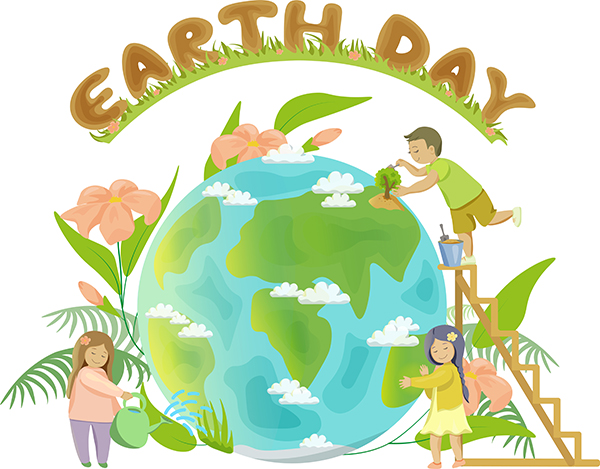
Celebrated each year on 22 April, Earth Day is a reminder of one of our most important relationships, the one with Planet Earth. Whether it is the air we breathe, the water we drink, or the food we grow and consume, our present and future depend on the health of our planet.[1]
To maintain, protect, and help it heal, this year’s Earth Day theme highlights the need to act (boldly), innovate (broadly), and implement (equitably).[2] To achieve this, it is essential to enable and foster collective action among governments, international organizations, industry and the private sector, as well as citizens, fast and inclusively.
Time is running out. Earth’s temperatures are set to rise by 2.7 degrees this century, even if the 2030 climate target is met.[3] This will categorically affect livelihoods, access to water, food, and resources, as well as the preservation of biodiversity. Compared to 50 years ago, natural disasters are three times more frequent and taking away around 60,000 lives annually. Moreover, each year, about 9 million people (of which 2 million are children under five) die because of environmental factors like pollution.[4]
In the past 20 years alone, plastic waste in seas and oceans increased by 49%, killing thousands of marine animals annually. Municipal and industrial wastes are also a complex and perennial challenge. The world generates over 2 billion tonnes of municipal solid waste each year, with at least 33 percent not being managed in an environmentally safe manner.[5] In the European Union (EU) alone, 775 million tonnes of waste were generated in 2020 (36 percent of the total waste generated), with the construction, mining, waste services, and manufacturing sectors being the top economic activities generating waste.[6]
Industry also plays a critical role in the generation, management, and disposal of waste. The daily production and delivery of goods and services require energy, materials, and resources, which result in greenhouse gas emissions, resource depletion, and biodiversity loss. As a response to these discouraging realities, concepts such as industrial waste mapping (IWM) have become increasingly popular especially for Small and Medium-sized Enterprises (SMEs) and company clusters such as industrial parks or economic zones.
In the EU’s Eastern Partnership region, thanks to regional initiatives under the EU4Environment Action, the potential benefits of IWM are brought closer to those who might need them the most. In 2022, six regions were selected in Azerbaijan, Georgia, and Ukraine to undergo IWM pilot exercises. In Azerbaijan, the waste mapping was carried out in Absheron-Khizi and Baku Economic Regions. The pilot regions were chosen based on Azerbaijan’s regional division, the nature of their respective industrial bases, and their potential for waste generation. In Georgia, two pilot municipalities (Rustavi and Zestaponi) participated in the exercise. They were chosen from all 10 Georgian regions, taking into account the presence of manufacturing industries or industrial parks, industrial wastes and waste recycling enterprises, high urban territory ratio, availability of waste sorting/treatment or disposal facilities, and the existence of waste management plans. In Ukraine, the IWM exercise was carried out in two Amalgamated Territorial Communities. In comparison to the previous municipality-based administrative model, the decision to work with Davydiv Village Territorial Community and Slavuta City Territorial Community was supported by the close relationship established between the new community administrations and the business sector.
In all three EaP countries, the mapping process identified waste streams, quantified the amount and types of waste, and found ways to reduce waste generation or reuse waste in other processes. Each pilot area was analysed in terms of industrial base, main sectors, and waste management system (taking into account the legislative, regulatory, and strategic context of each country). Afterwards, tailored lessons learned for waste mapping and recommendations for more circular waste management were provided. The six pilot regions included over 2,700 companies and almost 6,000 employees.
About Industrial Waste Mapping (IWM)
Waste mapping is a common method used to quantify and demonstrate the distribution and management of waste within a geographic area. The overall objective of IWM is to identify, assess, and map the waste streams of manufacturing enterprises in order to develop options for improved resource efficiency. This includes the analysis of the collection, transport, treatment and disposal of waste, together with the monitoring and regulation of the waste management process and waste-related laws, technologies, and economic mechanisms. An efficient waste management system creates increased business value for any manufacturing enterprise. This contributes to the sustainability of industries and the promotion of economic opportunities.
The initiative was developed under the EU4Environment programme, funded by the EU. It is the collaboration between team members from the United Nations Industrial Development Organization (UNIDO), an international expert team from a Swedish consultancy company, and the national partners of UNIDO in Azerbaijan, Georgia, and Ukraine.
For more information, please read:
Azerbaijan. Read the Executive Summary (English | Azerbaijani)
Georgia. Read the Executive Summary (English | Georgian)
Ukraine. Read the Executive Summary (English | Ukrainian)
[1] https://unis.unvienna.org/unis/pressrels/2023/unissgsm1309.html
[3] https://climate.ec.europa.eu/eu-action/european-green-deal/2030-climate-target-plan_en#:~:text=with%20other%20policies.-,Delivering%20the%202030%20Climate%20Target%20Plan,2030EN%E2%80%A2%E2%80%A2%E2%80%A2.
[4] https://www.thelancet.com/journals/lanplh/article/PIIS2542-5196(22)00090-0/fulltext
[5] https://datatopics.worldbank.org/what-a-waste/trends_in_solid_waste_management.html#:~:text=The%20world%20generates%202.01%20billion,from%200.11%20to%204.54%20kilograms.
[6] https://ec.europa.eu/eurostat/statistics-explained/index.php?title=Waste_statistics#:~:text=In%20the%20EU%2C%20775%20million,in%202020%20(Figure%203).





